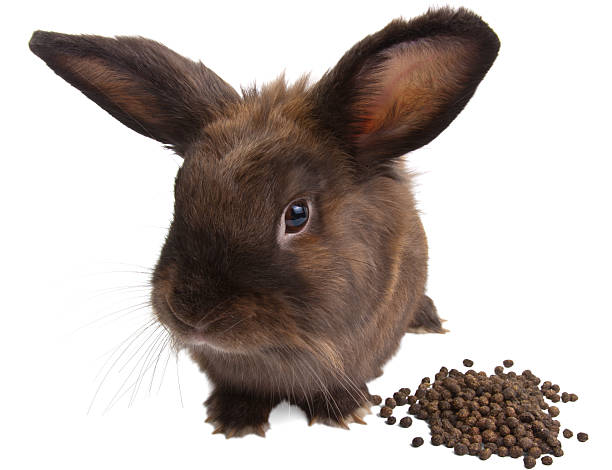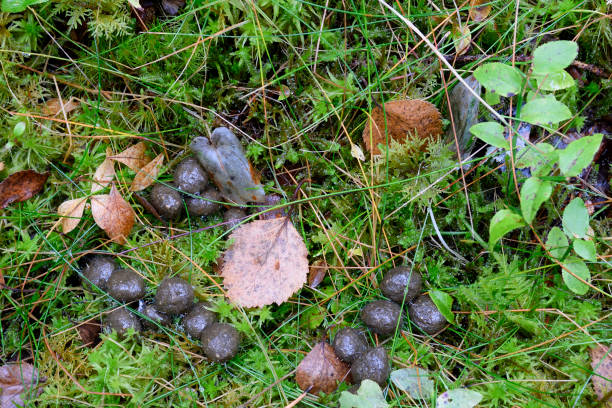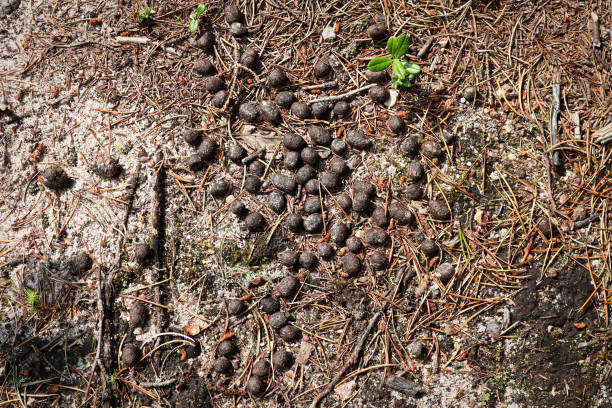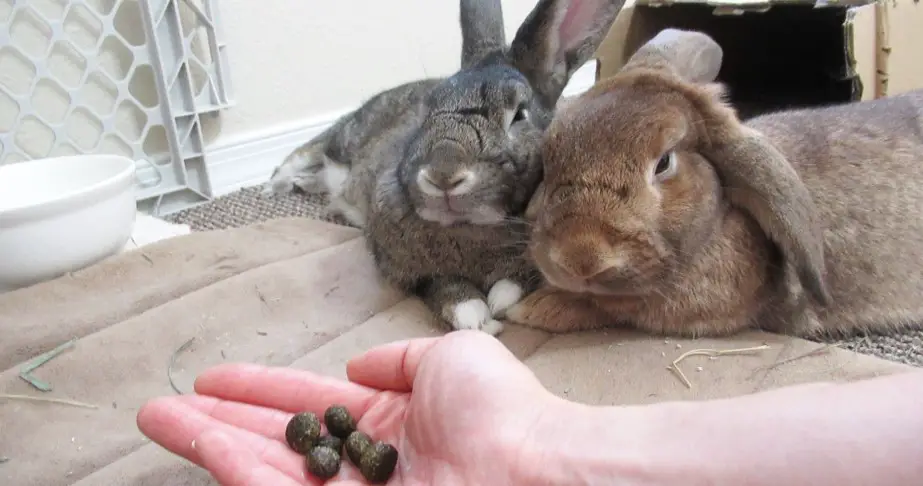Rabbit manure is a rich, nutrient-dense organic fertilizer that provides numerous benefits for fruit trees.
It’s characterized by its high nitrogen content, balanced N-P-K ratio, and abundance of essential micronutrients.
Unlike other animal manures, rabbit manure has a few distinct advantages.
It’s virtually odorless and an ideal choice for backyard gardens.
Its lower risk of burning plants and minimal weed seed contamination make it a valuable asset for fruit tree growers.
Nutritional Benefits of Rabbit Manure for Fruit Trees
Harnessing the nutritional benefits of rabbit manure is a sustainable and effective way to ensure the long-term health and productivity of your fruit trees.
Below are some of its nutritional benefits.

Nitrogen: Fuels Healthy Root Development
Nitrogen is a vital nutrient for fruit trees, as it plays an important role in root development and overall plant growth.
Rabbit manure is renowned for its high nitrogen content, providing a steady supply of this essential nutrient to fruit trees.
Adequate nitrogen levels stimulate robust root growth, which allows trees to efficiently absorb water and nutrients from the soil.
Well-developed roots enable fruit trees to withstand environmental stresses, such as drought, and establish a strong foundation for healthy growth.
Phosphorus and Potassium: Enhances Leaf Growth and Energy Reserves
The presence of phosphorus and potassium in rabbit manure has a profound impact on fruit tree vitality.
Phosphorus is essential for photosynthesis, the process by which plants convert sunlight into energy.
It promotes vibrant leaf growth and chlorophyll production, leading to lush foliage and efficient energy production.
Potassium, on the other hand, helps regulate various physiological processes within fruit trees, including water uptake and nutrient transport.
It also aids in the synthesis of carbohydrates, which ensures an ample supply of energy reserves for the tree’s growth and development.
Related: Best Mulches for Cherry Trees
Flower Formation and Fruit Set
Fruit production heavily relies on the successful formation of flowers and the subsequent fruit set.
Rabbit manure’s nutrient composition, particularly its phosphorus and potassium content, significantly influences these processes.
Phosphorus contributes to the development of strong and healthy flower buds, ensuring their successful emergence.
Potassium, on the other hand, plays a pivotal role in the pollination process that helps to transfer pollen and support fertilization.
Adequate levels of these nutrients improve fruit sets and lead to larger yields and better-quality fruits.
Micronutrients: Essential for Optimal Health and Disease Resistance
In addition to its macronutrient content, rabbit manure is a valuable source of essential micronutrients that are vital for fruit tree health and disease resistance.
Calcium, for instance, aids in cell wall development and promotes strong cell structure. It helps prevent disorders such as blossom end rot in fruits.
Magnesium is essential for chlorophyll synthesis and enzyme activation, ensuring proper photosynthesis and energy production.
Zinc, another important micronutrient, is involved in hormone regulation, enzyme activity, and overall plant metabolism.
These micronutrients contribute to the overall vitality of fruit trees and make them more resilient to pests, diseases, and environmental stresses.
How to Apply Rabbit Manure to Fruit Trees

Preparing and Collecting Rabbit Manure
Ensure that the manure is properly prepared and collected before applying it to your fruit trees.
If you have your rabbits, regularly clean their cages and collect the manure.
Alternatively, you can source rabbit manure from local farms or garden centers. Ensure that the manure is fresh and free from contaminants.
To prevent any potential risks, such as weed seed contamination or pathogen transmission, compost the manure before use.
Related: Is Cedar Mulch Good for Fruit Trees
Storage and Composting Techniques
Proper storage and composting of rabbit manure are essential for maximizing its benefits and reducing any potential risks.
Store the manure in a cool, dry area to prevent excessive moisture buildup and odor.
To compost the manure, create a compost pile or bin specifically for organic matter decomposition.
Layer the rabbit manure with other organic materials, such as straw, leaves, or kitchen scraps, to maintain an appropriate carbon-to-nitrogen ratio.
Regularly turn the compost pile to ensure proper aeration and decomposition.
Composting will help break down any potential pathogens, reduce odor, and transform the manure into a nutrient-rich amendment.
Direct Application and Incorporation into the Soil
One common method of applying rabbit manure to fruit trees is through direct application and incorporation into the soil.
Start by spreading a layer of the composted rabbit manure around the base of the tree, avoiding direct contact with the trunk.
Then, gently incorporate it into the top layer of soil using a garden fork or rake.
This method ensures that the nutrients are evenly distributed and readily accessible to the tree’s roots.
It is recommended to apply the manure in early spring or late fall when the tree is dormant or during the growing season in small, incremental amounts to avoid overwhelming the tree’s nutrient uptake capacity.
Rabbit Manure Tea for Foliar Feeding
Another effective way to use rabbit manure is by making a nutrient-rich tea for foliar feeding.
To prepare rabbit manure tea, place a mesh bag or old pillowcase filled with composted rabbit manure into a container of water.
Allow it to steep for a few days, periodically stirring or agitating the mixture.
The water will become infused with the nutrients from the manure.
Dilute the tea by mixing it with water at a ratio of 1:10 (1 part tea to 10 parts water), and then apply it directly to the leaves and stems of the fruit tree using a spray bottle or a garden sprayer.
Foliar feeding provides a quick and direct nutrient absorption route for the tree, enhancing its overall health and vigor.
Related: Root Mulch vs. Hardwood Mulch
Timing and Frequency Considerations
It’s important to consider the timing and frequency of application when applying rabbit manure to fruit trees.
For direct application and soil incorporation, early spring or late fall is generally recommended when the tree is not actively growing.
However, during the growing season, small applications of composted rabbit manure can be made every 4-6 weeks to provide a steady supply of nutrients.
When using rabbit manure tea for foliar feeding, it’s best to apply it during the early morning or late afternoon when the tree’s stomata are open. This allows for optimal nutrient absorption.
Calculating Appropriate Application Rates
This is important to avoid over-fertilization and potential risks.
Factors such as the size and age of the fruit tree, soil conditions, and nutrient requirements should be taken into consideration.
As a general guideline, for direct application and soil incorporation, apply approximately 1-2 pounds (0.5-1 kg) of composted rabbit manure per square yard (square meter) around the drip line of the tree.
When using rabbit manure tea for foliar feeding, dilute it as mentioned earlier and apply enough to thoroughly coat the leaves and stems without causing excessive runoff.
Things to Consider When Using Rabbit Manure for Fruit Trees

Using rabbit manure, like any gardening practice, may present a few challenges. Here are some major factors to consider.
Potency of Fresh Rabbit Manure
Fresh rabbit manure can be too potent for fruit trees and may cause root or foliage burns.
Composting the manure before application helps reduce the risk and makes the nutrients more accessible.
Monitoring Nutrient Deficiencies and Excesses
Regularly inspect the trees for signs of nutrient deficiencies or excesses. Adjust application rates or supplement with other organic fertilizers to maintain a balanced nutrient profile.
Maintaining a Balanced Approach to Fertilization
Rabbit manure should not be the sole source of nutrients. Combine it with other organic practices like composting, mulching, and cover cropping for overall soil health and a diverse nutrient supply.
Understanding Specific Tree Needs
Different fruit trees have varying nutrient requirements.
Research their specific needs based on species, growth stage, and soil conditions to optimize the benefits of rabbit manure application.
Related
- Best Gravels to Walk on Bare Feet
- 10 Best Mulch for Wet Areas
- Top 7 Disadvantages of Decomposed Granite
- Grass Mulching Pros and Cons
- Gorilla Hair Mulch Pros and Cons
- Best Mulch for Perennials
- Where to Get Wood Chips for Gardens
- Top 10 Wholesale Mulch Suppliers
- Best Mulch for Raised Bed Vegetable Garden
- Root Mulch vs. Hardwood Mulch: This is the Better One


